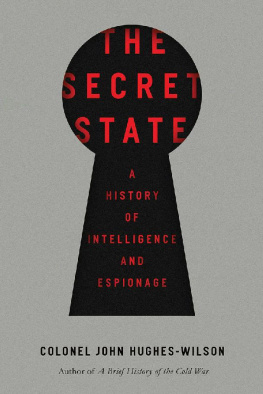Appendix Six - Table of Major Allied Aircraft ProgrammesSince 1939 Sabotaged by German Intelligence
Appendix Seven - Major Incidents of Sabotage of CommercialAircraft Since 1945 by the DVD
Acknowledgements
This book could not have been written without the strongsupport of family and friends, to whom I am extremely grateful. I have also hadtremendous support from a team of researchers, non-blind peer reviewers,proofreaders, colleagues in the Intelligence Community and fellow authors, whohave been generous with their time and comments. Only my learned friend RafailVeli Esq. in Canada has been bold enough to agree to be named. This is probablya tribute to the efficiency of the Royal Canadian Mounted Police, who do nottolerate German spies misbehaving on their patch!
I am also most grateful to Dr Robert Kaplan inJerusalem, for his kind and thoughtful Foreword. He has an instinctive feel forthe problems facing both the author and the reader of an intelligence historysuch as this. I can only respectfully endorse his recommendation that readersuse their own eyes and think with their own minds. Keith Carson and the team atJune Press have been brilliant.
If any one feels they havebeen left out they need only tell me and I shall ensure that they are named inthe next edition. This is an intelligence text, and the black agency I havewritten about, the DVD, are very real, with a long reach. It is quiteunderstandable that people do not want to risk being strafed in the early hourswith Schmeissers by a Jerry goon squad!
I am sure I should be gratefulto the Cabinet Office, for sanctioning an illegal raid on my home in adesperate effort, Spycatcher style, to suppress publication. There isnothing like an illegal raid and book seizure to boost sales. I hope thatThames Valley Police enjoyed the book, even though it was written for theinformed and intelligent reader, no offence intended. I am afraid that I amunlikely to get a ticket to this years Thames Valley Secret Policemans Ball.
Any errors are of course myresponsibility and mine alone.
Foreword
Michael Shrimptons Spyhunter is an importantbook, which if its lesson is learned, should change the course of history. Itssubject is the conspiratorial means employed by Germany to achieve its goalsfrom its founding in 1870 until the present day.
War has been the non-conspiratorial means employedby Germany: - World War II preceded by World War I, preceded by theFranco-Prussian War, preceded the war with Austria, preceded by war withDenmark. In Spyhunter, Shrimpton focuses on Germanys conspiracies -pre-war, wartime, post-war and peace time.
In recent decades conspiracy has got a bad name,often confusedly equated with conspiracy theory. Conspiracy theory, a termwhich since the mid-1960s has acquired a somewhat derogatory meaning, implyinga paranoid tendency to see the influence of some malign covert agency inevents, serves as a label to be slapped onto an alleged conspiracy in order todiscredit it regardless of the evidence for its existence. A respectedprofessor of history at a Boston university demonstrated this when he told meI dont believe in conspiracies. Clearly this professor did not really meanwhat he said. As a professor of modern European history he has taught about theDreyfus Affair, in which French army leaders conspired to convictCaptain Alfred Dreyfus of treason and conspired to prevent properjudicial review of the case, and has taught about the outbreak of World War Iin which a small group of German leaders conspired to launch a war ofaggression while making it appear to be a war of defense.
A conspiracy is a plan of action to do evilconcocted in secret by a relatively few individuals. In contrast conspiracytheory refers to a supposed conspiracy for which there is no reliable or evenplausible evidence. The fact that the subject of Spyhunter is conspiracywill lead some, including, of course, those directly or indirectly in the payof Germany, to dismiss it out of hand as conspiracy theory.
Mr Shrimptons book may have difficulty receivingthe attention it deserves due to the fact that it is an intelligence history.In contrast with the familiar academic histories, which cite sources that arepublicly available such as books, newspapers, archives, letters, diaries aswell as interviews of identified sources, intelligence history relies onunidentified or partially unidentified sources who as a condition forcommunicating with the author, require that their identity not be disclosed.
Intelligence histories are relatively rare. I canrecall reading only three - John Loftuss The Secret War Against the Jews,Cees Wiebes Intelligence in the War in Bosnia, 1992-1995 and nowMichael Shrimptons Spyhunter. Wiebes work is highly respected and Irefer to it as a source myself.
Regarding the question of whether the government oftodays Germany maintains Germanys goals of the past or has given them up,Shrimpton differs sharply from the common view. It is easily understood that leaders of Germany would want othersto believe that its present aims differ from those of the past whether in factthey do or do not. Awareness of this should help those who are interested inthe question discerning discrepancies between the impression German leaderswould like to convey and the goals which, in fact, they pursue; motives may bediscerned if looked for with care.













